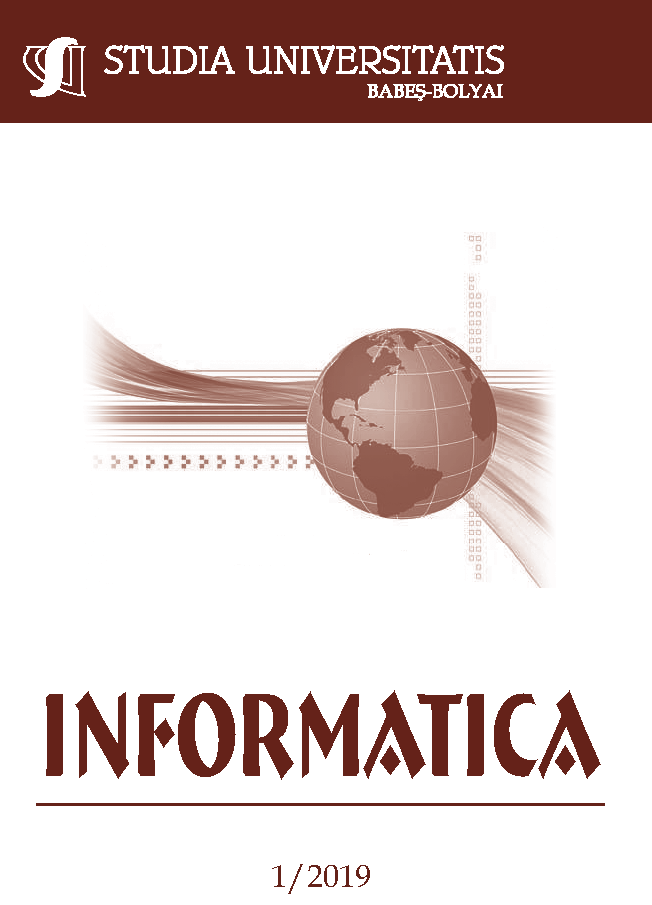BENCHMARKING COGNITIVE ABILITIES OF THE BRAIN WITH THE EVENT OF LOSING THE CHARACTER IN COMPUTER GAMES
DOI:
https://doi.org/10.24193/subbi.2019.1.02Keywords:
esport, talent search, benchmark program, visual complexity, losing character, psychology test.Abstract
Most computer game players have experienced the sensation of temporarily losing their character in a given gameplay situation when they cannot control the character, simply because they temporarily cannot see it. The main reasons for this sensation may be due to the interplay of the following factors: (1) the visual complexity of the game is unexpectedly increased compared with the previous time period as more and more game objects and effects are rendered on the display; (2) and/or the game is lagging; (3) and finally, it is also possible that the players don’t have sufficient experience with controlling the character. This paper focuses on the first reason. We have developed a benchmark program which allows its user to experience the sensation of losing character. While the user can still control the character quite well, the benchmark program will increase the visual complexity of the display. Conversely, if the user loses the character then the program will decrease the complexity until the user finds the character again, and so on. The complexity is measured based on the number of changed pixels between two consecutive display images. Our measurements show that the average of bit per second values of losing and finding pairs describes the user well. The final goal of this research is to further develop our benchmark to a standard psychological test.
References
J. A. Anguera, J. Boccanfuso, J. L. Rintoul, O. Al-Hashimi, F. Faraji, J. Janowich, E. Kong, Y. Larraburo, C. Rolle, E. Johnston, and A. Gazzaley. Video game training enhances cognitive control in older adults. Nature, 501(7465):97–101, 2013.
N. Bátfai. esport-talent-search. GitHub repository, 2017. https://github.com/nbatfai/esport-talent-search (visited: 2018-09-09).
N. Bátfai, G. Bogacsovics, R. Paszerbovics, A. Antal, I. Czevár, V. Kelemen, and R. Besenczi. E-sportolók mérése (Measuring esport athletes). Információs Társadalom, 18(1):146–155, 2018. Original document in Hungarian: http://real.mtak.hu/79216/1/it_2018_1_10_batfai_et_al.pdf (visited: 2018-09-09).
N. Bátfai, D. Papp, R. Besenczi, G. Bogacsovics, and D. Veres. Benchmarking Cognitive Abilities of the Brain with Computer Games. ArXiv e-prints, 2018. https://arxiv.org/abs/1809.00172 (visited: 2018-09-09).
B. Bediou, D. M. Adams, R. E. Mayer, E. Tipton, C. S. Green, and D. Bavelier. Meta analysis of action video game impact on perceptual, attentional, and cognitive skills. Psychological bulletin, 144(1):77–110, 2018.
V. Csépe, M. Győri, and A. Ragó. Általános pszichológia 1. - Észlelés és figyelem. Osiris Kiadó, 2007.
J. Geyer, P. Insel, F. Farzin, D. Sternberg, J. L. Hardy, M. Scanlon, D. Mungas, Kramer, R. S. Mackin, and M. W. Weiner. Evidence for age-associated cognitive decline from internet game scores. Alzheimer’s & Dementia: Diagnosis, Assessment & Disease Monitoring, 1(2):260–267, 2015.
B. D. Homer, J. L. Plass, C. Raffaele, T. M. Ober, and A. Ali. Improving high school students’ executive functions through digital game play. Computers & Education, 117:50–58, 2018.
N. H. Mackworth. The breakdown of vigilance during prolonged visual search. Quarterly Journal of Experimental Psychology, 1(1):6–21, 1948.
M. Moisala, V. Salmela, L. Hietajärvi, S. Carlson, V. Vuontela, K. Lonka, Hakkarainen, K. Salmela-Aro, and K. Alho. Gaming is related to enhanced working memory performance and task-related cortical activity. Brain Research, 1655:204–215, 2017.
R. Nieva. Facebook’s moonshots: making brains type and skin hear, 2017. https://www.cnet.com/news/facebook-f8-building-8-moonshot-projects-zuckerberg-regina-dugan/ (visited: 2018-09-09).
B. Pataki, P. Hanák, and G. Csukly. Computer games for older adults beyond entertainment and training: possible tools for early warnings-concept and proof of concept. In ICT4AgeingWell, pages 285–294, 2015.
B. Pataki, P. Hanák, and G. Csukly. Surpassing entertainment with computer games: online tools for early warnings of mild cognitive impairment. In M. Helfert, A. Holzinger, M. Ziefle, A. Fred, J. O’Donoghue, and C. Röcker, editors, Information and Communication Technologies for Ageing Well and e-Health, pages 217–237. Springer International Publishing, 2015.
D. E. Powers. Test preparation for the GRE analytical ability measure: differential effects for subgroups of GRE test takers. ETS Research Report Series, 86(2):1–19, 1986.
D. E. Powers and S. S. Swinton. Effects of self-study for coachable test item types. Journal of Educational Psychology, 76(2):266–278, 1984.
S. Rózsa, N. O. Nagybányai, and A. Oláh. A pszichológiai mérés alapjai: elmélet, módszer és gyakorlati alkalmazás. Bölcsész Konzorcium, 2006.
C. Sagan. Dragons of Eden: speculations on the evolution of human intelligence. Random House Publishing Group, 2012.
S. C. Seow. Information theoretic models of HCI: a comparison of the Hick-Hyman law and Fitts’ law. Human-Computer Interaction, 20(3):315–352, 2005.
E. Toulouse and H. Piéron. Toulouse-Piéron-Revisado Prueba perceptiva y de atención. TEA, 8 edition, 2013. http://www.web.teaediciones.com/Ejemplos/Extracto_libro_TP-R.pdf (visited: 2018-09-09).
H. A. Witkin, H. B. Lewis, M. Hertzman, K. Machover, P. Meissner, and S. Bretnall Wapner. Personality through perception: an experimental and clinical study. Harper, Oxford, England, 1954.
R. M. Yerkes and J. D. Dodson. The relation of strength of stimulus to rapidity of habit-formation. Journal of Comparative Neurology and Psychology, 18:459–482, 1908.
Downloads
Published
How to Cite
Issue
Section
License
Copyright (c) 2019 Studia Universitatis Babeș-Bolyai Informatica

This work is licensed under a Creative Commons Attribution-NonCommercial-NoDerivatives 4.0 International License.





